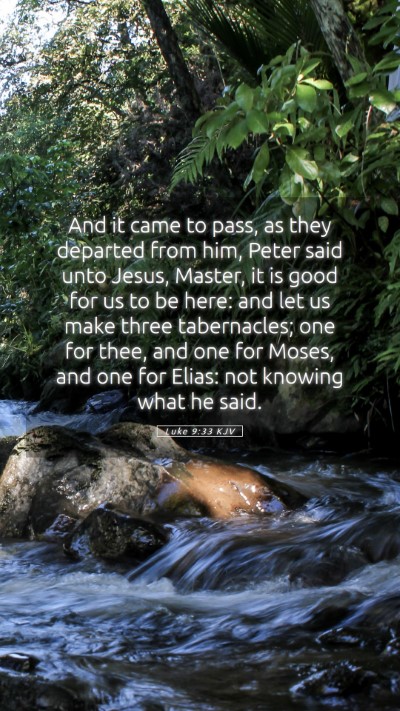Understanding Luke 9:33: A Comprehensive Commentary
Bible Verse: Luke 9:33 - "And it came to pass, as they departed from him, Peter said unto Jesus, Master, it is good for us to be here: and let us make three tabernacles; one for thee, and one for Moses, and one for Elias: not knowing what he said."
Introduction to Bible Verse Meanings
Luke 9:33 captures a pivotal moment during the Transfiguration of Jesus, where Peter expresses a desire to stay in this divine presence. The verse is significant as it illustrates Peter's reaction to witnessing Jesus conversing with Moses and Elijah, which speaks to the broader themes of divine affirmation and the continuity of Scripture. This commentary will break down the elements of this verse, providing insights that enhance our Bible verse understanding and deepen our Bible study insights.
Verse Breakdown and Exegesis
- Contextual Setting:
The Transfiguration narrative (Luke 9:28-36) occurs shortly before Jesus' final journey to Jerusalem, establishing the divine validation of His mission. The presence of Moses and Elijah signifies the Law and the Prophets bearing witness to Jesus as the Messiah.
- Peter's Proposal:
Peter’s suggestion to build three tabernacles indicates a desire to commemorate the experience. In Jewish tradition, the Feast of Tabernacles represented God's dwelling among His people. However, this reflects a misunderstanding of the moment's significance. He wished to preserve this transitory experience rather than grasp its temporal purpose.
- Not Knowing What He Said:
This phrase highlights Peter's lack of understanding and serves as a reminder of human folly. Despite his desire to honor the moment, his statement was out of context, suggesting a misunderstanding of Jesus’ mission and the purpose of the Transfiguration.
Theological Implications
This verse illustrates the intersection of divine revelation and human perception. As noted in the Bible verse interpretations by Matthew Henry, Peter's instinctive reaction encapsulates human desire for permanence in fleeting divine encounters, reflecting a challenge in spiritual understanding.
What Does Luke 9:33 Mean?
The meaning of Luke 9:33 extends beyond Peter’s words; it emphasizes the importance of recognizing divine moments without seeking to control them. Albert Barnes interprets this as a reminder to allow God’s presence to guide us, rather than attempting to confine it through our limitations.
Application of the Verse
Applying the truths found in Luke 9:33 to our lives encourages a posture of receptivity to God’s plans. Just as Peter wanted to memorialize a powerful moment, we too may struggle with understanding the temporal nature of some of our spiritual experiences. Bible study groups can explore how to recognize and honor God’s presence without clinging to moments that are meant to pass and transform.
Cross Reference Verses
- Matthew 17:1-3 - The parallel account of the Transfiguration; offers insight into the event's significance.
- Mark 9:5 - Provides additional confirmation of Peter's words and their implications.
- 2 Peter 1:16-18 - Peter reflects on this experience later, emphasizing its validity and significance.
Conclusion
Ultimately, Luke 9:33 serves as a poignant reminder of our tendency to misinterpret divine encounters and the importance of understanding God’s overarching narrative. By exploring these insights, we cultivate a richer Biblical exegesis and a deeper Scripture analysis. We encourage further study through Bible study tools and Bible study resources, facilitating discussions on understanding the depth of the Scriptures in our daily lives.
Encouragement for Further Study
To deepen your Bible verse explanations, consider engaging in online Bible study, utilizing Bible study guides, and exploring Bible study lessons tailored to understanding difficult passages. Use Bible study plans that focus on the significance of Jesus' teachings, ensuring a well-rounded approach to these essential truths.


